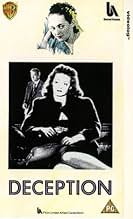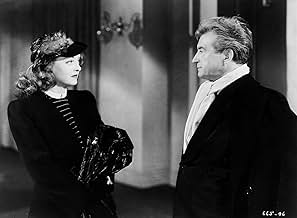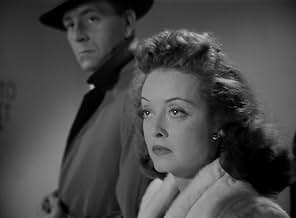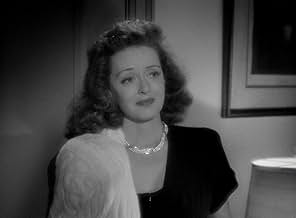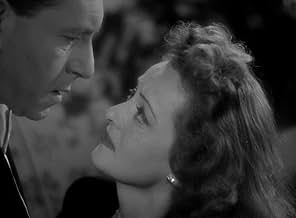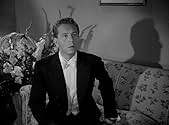PUNTUACIÓN EN IMDb
7,1/10
4,5 mil
TU PUNTUACIÓN
Añade un argumento en tu idiomaAfter marrying her long-lost love, a musician finds the relationship threatened by a wealthy composer who is besotted with her.After marrying her long-lost love, a musician finds the relationship threatened by a wealthy composer who is besotted with her.After marrying her long-lost love, a musician finds the relationship threatened by a wealthy composer who is besotted with her.
- Dirección
- Guión
- Reparto principal
- Premios
- 4 premios en total
John Alban
- Concertgoer
- (sin acreditar)
Russell Arms
- Music Student
- (sin acreditar)
Lois Austin
- Norma - Wedding Guest
- (sin acreditar)
Patricia Barry
- Music Student
- (sin acreditar)
Brandon Beach
- Concertgoer
- (sin acreditar)
Lulu Mae Bohrman
- Restaurant Diner
- (sin acreditar)
Paul Bradley
- Concertgoer
- (sin acreditar)
James Carlisle
- Restaurant Diner
- (sin acreditar)
Gertrude Carr
- Wedding Guest
- (sin acreditar)
James Conaty
- Well-Wisher at Concert
- (sin acreditar)
Marcelle Corday
- Hat Check Woman
- (sin acreditar)
Gino Corrado
- Waiter
- (sin acreditar)
Suzi Crandall
- Music Student
- (sin acreditar)
Reseñas destacadas
On a recent Turner Classic Movies broadcast, I finally caught up with all of this one, having seen only snippets of it before. Everybody involved was obviously given free rein, from the lead actors all the way through to every behind-the-scenes artisan, the best that Warner Brothers could muster at the time. Claude Rains and Bette Davis spar in magnificent style, with Rains, stroking the fur of his pet Siamese cat, winning by default, since he was given a role which is so over-the-top that, in the hands of a lesser actor, it would have verged on outrageous camp. (Check out the rococo New York brownstone mansion in which he's ensconced, more magnificent than anything a lesser studio could provide for a monarch in a story involving royalty!)
Poor Paul Henreid has a particularly thankless role to play, swinging like an erratic pendulum between jealous tantrums and thoroughly deceived naïveté, but his simulations of the movements of a top-flight cello musician are convincing enough to allow all to be forgiven.
Erich Wolfgang Korngold's music is probably the film's chief asset and it probably sounded superb over the monophonic sound systems when this film was released, since Warners' sound technicians were the best in Hollywood back then. (Unfortunately the soundtrack during the telecast I heard was very wobbly - a real disappointment. Wonder what the problem was, since this certainly isn't the case with many films dating even further into the past.)
While it may not be a delicacy fit for a cinematic gourmet, it's more than passably entertaining for its nearly two-hours running time.
Poor Paul Henreid has a particularly thankless role to play, swinging like an erratic pendulum between jealous tantrums and thoroughly deceived naïveté, but his simulations of the movements of a top-flight cello musician are convincing enough to allow all to be forgiven.
Erich Wolfgang Korngold's music is probably the film's chief asset and it probably sounded superb over the monophonic sound systems when this film was released, since Warners' sound technicians were the best in Hollywood back then. (Unfortunately the soundtrack during the telecast I heard was very wobbly - a real disappointment. Wonder what the problem was, since this certainly isn't the case with many films dating even further into the past.)
While it may not be a delicacy fit for a cinematic gourmet, it's more than passably entertaining for its nearly two-hours running time.
Deception (1946)
A marvelous chamber piece, in a way, involving orchestral music. The cast begins with two principals, played with usual intensity by Bette Davis and with usual restraint by Paul Henreid. This broods a bit and suggests trouble, and then comes the third player, who outdoes them both, in the form of Claude Rains. The rest of the movie is an interplay between the three, a push and pull and game of dodging and, of course, deception.
So how to judge this kind of tightly woven enterprise? It feels as though William Wyler could have directed it, so polished and rich it all is. But this is a Warner Brothers drama, so there is another kind of layer of dark danger, and of a noir inspired lighting and camera-work. This visual aspect, in a way, is the real star of the film, which says a lot, considering the high level of acting involved.
In all it's purely an entertainment, but at the highest level. The backdrop of classic music and classical musicians hasn't worn well over the years, but I grew up with this kind of scene and it brought back a lot of those vibes. A terrific movie within its own genre.
A marvelous chamber piece, in a way, involving orchestral music. The cast begins with two principals, played with usual intensity by Bette Davis and with usual restraint by Paul Henreid. This broods a bit and suggests trouble, and then comes the third player, who outdoes them both, in the form of Claude Rains. The rest of the movie is an interplay between the three, a push and pull and game of dodging and, of course, deception.
So how to judge this kind of tightly woven enterprise? It feels as though William Wyler could have directed it, so polished and rich it all is. But this is a Warner Brothers drama, so there is another kind of layer of dark danger, and of a noir inspired lighting and camera-work. This visual aspect, in a way, is the real star of the film, which says a lot, considering the high level of acting involved.
In all it's purely an entertainment, but at the highest level. The backdrop of classic music and classical musicians hasn't worn well over the years, but I grew up with this kind of scene and it brought back a lot of those vibes. A terrific movie within its own genre.
One of the few actors of Bette Davis' time who could match her screen intensity was Claude Rains. Paul Henreid is paired with Davis as her true love for another convincing romance. But, the script-stealing scene is between Davis and Rains. Matched penultimately perfect for the picture, Davis and Rains match each other's most intense acting skills during a major bedroom blow-out between them. I live to watch that scene over and again for its acting mastery.
Since Deception is about three classical music artists, the classical music score makes Deception's choice script musically enhanced to a classy degree. I love how Rains takes "the 4th Warner Brother's" acting intensity and levels it with his own. Even Bogie couldn't do that when staged with Davis! Don't miss this tightly wound triangulation with Henreid underplaying himself as his role calls for.
Since Deception is about three classical music artists, the classical music score makes Deception's choice script musically enhanced to a classy degree. I love how Rains takes "the 4th Warner Brother's" acting intensity and levels it with his own. Even Bogie couldn't do that when staged with Davis! Don't miss this tightly wound triangulation with Henreid underplaying himself as his role calls for.
Irving Rapper's "Deception" reunited the three stars of a much better Bette Davis' vehicle: "Now Voyager". This is a film where all three stars shine equally. "Deception" was based on a play and the adaptation has opened it in unexpected ways. This satisfying melodrama has one thing going for it: the great music one hears throughout the movie, it's highlight being the Korngold Cello concerto, a rarity seldom heard, let alone in films. We are also treated to the beginning of Beethoven's Apassionata sonata as well.
Christine Radcliffe is a musician who gets separated from the love of her life, Karel Novak, one of the best cellist of Europe, before the advent of WWII. Christine comes back to New York, where she becomes the lover of a famous composer, Alexander Hollenius. One day, Christine discovers Karel's name playing in a second class venue in Manhattan, where they are reunited.
Christine doesn't have the nerve to tell Karel about what has happened in the intervening years. It's obvious Christine has done well for herself, as Karel discovers Christine lives in a great apartment, he finds closets full of elegant and expensive clothes, furs, jewelry, which doesn't make sense to him. Little does he know everything has come out of the generosity of Alexander Hollenius, a composer that fell in love with Christine and obviously, became her lover. Christine is coy in not revealing the truth, which keeps interfering with her happiness, until it comes to a head as Hollenius threatens Christine to tell it all to Karel after he plays the concert. It's at that point that Christine realizes she is cornered and must face reality and the fact that she will lose the man she really loves.
Bette Davis made a fine Christine, a woman she was born to play. Ms. Davis is amazing in the film, which unfortunately, is forgotten by all her admirers when comparing this role to her other great screen portraits. Claude Rains, who worked so well with Ms. Davis, gives an incredible performance as the egotistical composer who is afraid to lose his own creation. This has to be one of Mr. Rains' best appearances in a film. Paul Henried is perfect as Karel, the European cellist madly in love with Christine, a woman he thought he had lost forever. Mr. Henried is an elegant figure in this film, something that he projected effortlessly.
Ernest Haller's cinematography greatly enhances all we see on the screen. Mr. Haller was one of the best photographers working in that period, as he clearly shows here. George James Hopkins' sets not only are opulent, but he clearly knew how to get the most of his interior designs.
The film is an engrossing tale that will satisfy the fans of this genre.
Christine Radcliffe is a musician who gets separated from the love of her life, Karel Novak, one of the best cellist of Europe, before the advent of WWII. Christine comes back to New York, where she becomes the lover of a famous composer, Alexander Hollenius. One day, Christine discovers Karel's name playing in a second class venue in Manhattan, where they are reunited.
Christine doesn't have the nerve to tell Karel about what has happened in the intervening years. It's obvious Christine has done well for herself, as Karel discovers Christine lives in a great apartment, he finds closets full of elegant and expensive clothes, furs, jewelry, which doesn't make sense to him. Little does he know everything has come out of the generosity of Alexander Hollenius, a composer that fell in love with Christine and obviously, became her lover. Christine is coy in not revealing the truth, which keeps interfering with her happiness, until it comes to a head as Hollenius threatens Christine to tell it all to Karel after he plays the concert. It's at that point that Christine realizes she is cornered and must face reality and the fact that she will lose the man she really loves.
Bette Davis made a fine Christine, a woman she was born to play. Ms. Davis is amazing in the film, which unfortunately, is forgotten by all her admirers when comparing this role to her other great screen portraits. Claude Rains, who worked so well with Ms. Davis, gives an incredible performance as the egotistical composer who is afraid to lose his own creation. This has to be one of Mr. Rains' best appearances in a film. Paul Henried is perfect as Karel, the European cellist madly in love with Christine, a woman he thought he had lost forever. Mr. Henried is an elegant figure in this film, something that he projected effortlessly.
Ernest Haller's cinematography greatly enhances all we see on the screen. Mr. Haller was one of the best photographers working in that period, as he clearly shows here. George James Hopkins' sets not only are opulent, but he clearly knew how to get the most of his interior designs.
The film is an engrossing tale that will satisfy the fans of this genre.
I'll dispense with the details of the plot and move directly to Mr. Rains' performance as Hollenius the composer in this musico-melodrama.
This is his show although Davis and Henreid attempt to hold their own in this film.
His flair for manipulation and deception, hence the title, dominates the film.
He does a great job of it, driving everyone crazy with his shenanigans and jealousy.
The cinematography is well done and the story's setting in the world of post-WW II classical/modern music is interesting.
I noted that early on, for instance, as Henreid finished a performance, audience members asked him who his favorite living composer was..."Sibelius...or Shostakovich...?" No mention of Aaron Copland or the many other composers alive at the time.
Hollenius' work as a composer was a curious mix of tonal, traditional and slightly atonal influences, attempting to display "modern" music but watered down to keep the audience and us interested.
The mimicking of the piano and cello performances by all three actors was fairly well done.
I found it quite interesting too that both Davis and Rains were not "starving artists" like Henreid. Opulent apartments and lifestyles for piano teachers and composers were not common, but these two were well-off in an even garish sense.
This was not the reality of the time in the music world.
I'd recommend this film if you're a Rains or Davis fan. Henreid was not used for his full potential.
This is his show although Davis and Henreid attempt to hold their own in this film.
His flair for manipulation and deception, hence the title, dominates the film.
He does a great job of it, driving everyone crazy with his shenanigans and jealousy.
The cinematography is well done and the story's setting in the world of post-WW II classical/modern music is interesting.
I noted that early on, for instance, as Henreid finished a performance, audience members asked him who his favorite living composer was..."Sibelius...or Shostakovich...?" No mention of Aaron Copland or the many other composers alive at the time.
Hollenius' work as a composer was a curious mix of tonal, traditional and slightly atonal influences, attempting to display "modern" music but watered down to keep the audience and us interested.
The mimicking of the piano and cello performances by all three actors was fairly well done.
I found it quite interesting too that both Davis and Rains were not "starving artists" like Henreid. Opulent apartments and lifestyles for piano teachers and composers were not common, but these two were well-off in an even garish sense.
This was not the reality of the time in the music world.
I'd recommend this film if you're a Rains or Davis fan. Henreid was not used for his full potential.
¿Sabías que...?
- CuriosidadesPaul Henreid could not play the cello. While he was able to fake it in the long shots, to achieve the illusion in closeup, he wore a special jacket with no sleeves and holes for two real cellists to insert their arms - one to bow, and one to accurately finger the music - while seated behind him, out of shot.
- PifiasWhile Christine, alone in her studio, is talking to Alexander Hollenius on the telephone, the highly visible shadow of a crew member is moving back and forth across the piano behind her.
- Citas
Alexander Hollenius: [snatches his bleeding hand away from Christine] Like all women - white as a sheet at the sight of a couple of scratches... calm and smiling like a hospital nurse in the presence of a mortal wound... Good night!
- ConexionesEdited into Cliente muerto no paga (1982)
- Banda sonoraHollenius' Cello Concerto
Music by Erich Wolfgang Korngold
Performed by Paul Henreid (dubbed by Eleanor Slatkin)
Selecciones populares
Inicia sesión para calificar y añadir a tu lista para recibir recomendaciones personalizadas
- How long is Deception?Con tecnología de Alexa
Detalles
- Duración
- 1h 55min(115 min)
- Color
- Relación de aspecto
- 1.37 : 1
Contribuir a esta página
Sugerir un cambio o añadir el contenido que falta




